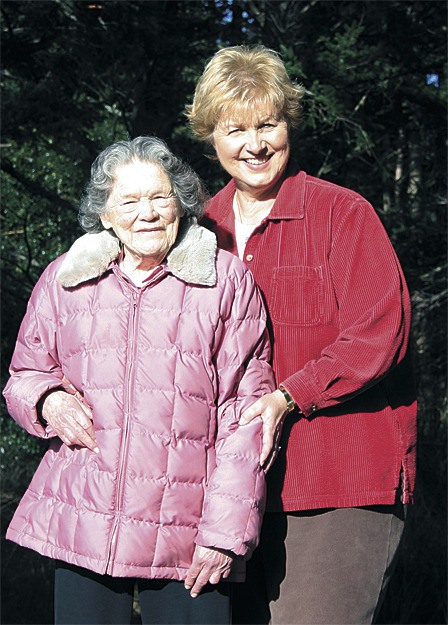Grace Kidder has a legion of good friends who come to visit and take her out to lunch.
But as an 87-year-old woman living alone, life has its challenges.
And that’s where Hearts and Hands comes in to play.
The Orcas non-profit pairs volunteers with seniors who need a little extra help. It can be as simple as playing cards, sharing a cup of tea, or assisting with housework.
Kidder has had several Hearts and Hands volunteers, but Michele Streich has been her one and only since July.
“Michele helps me out in many ways,” Kidder said. “Emotionally, if I’ve been feeling a little down, she always lifts my spirits. Michele is always so upbeat. And the feeling that I can keep the house up. I want to stay in my house, but it isn’t completely fun sometimes.”
Kidder still drives to town several times a week to do grocery shopping and run errands, and last year she took her driver’s test and “passed with flying colors.” She says she always has projects going on, but writing letters is a challenge because of tendinitis in her arm.
Instead of sending out individual Christmas cards this year (as many as 60), Streich had a better idea: a typed newsletter.
“I brought my computer over, and I was Grace’s secretary for the day,” she said.
Streich is on the senior services advisory board, and says she “has a soft spot” for seniors.
“I wanted personal interaction with a senior, so I decided to become a volunteer with Hearts and Hands,” Streich said.
Originally a program of Lahari Hospice, Hearts and Hands was absorbed by the senior center last year. Coordinator Betsy Louton says the program has been revitalized by the move.
“We’ve got more visibility,” she said. “Seniors are resilient but reticent to ask for help.”
The number of recipients has gone from 16 to 26, and the volunteer force has doubled to 30.
“We can usually match people up, but right now there is an imbalance,” Louton said. “We need three more recipients.”
A typical senior recipient is over 80, lives alone, and has limited means of transportation.
“Typically, they have friends, but don’t want to exhaust the friendship by asking for services,” Louton said. “For many people on the island, this help is enough to keep them independent. Many of these people had active, professional lives, and now their world is limited.”
Hearts and Hands volunteers provide rides, companionship, light housekeeping, and some meal preparation, but bathing and medical needs are not included.
Volunteer training includes how to be a good listener, ways to show compassion and sensitivity, and ensure confidentiality. Many program recipients want anonymity. Louton does her best to match personalities, but if a pairing doesn’t click, she assigns someone new.
Most volunteers are in their 50s and 60s, but the program has several who are younger. They meet once a quarter to talk about their experiences and formulate policies.
The time commitment is generally two hours a week. While it’s flexible, Louton does ask her caregivers to be available at least once a week.
“What develops the most is a relationship. It’s a two-way exchange,” Louton said. “The volunteer gets tremendous enjoyment out of the relationship as well.”
That is certainly the case for Streich and Kidder.
“I so enjoy her stories about her family and her time here,” Streich said.
Kidder has lived on Orcas for 21 years. Her family moved to the island in 1960 and built a cabin in Westsound.
“My dad built boats, not as a vocation, but because he loved it,” she said. “The mark of a good boat was if it could rise to a wave and settle down quickly. I can still hear him talking about it.”



